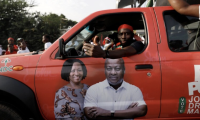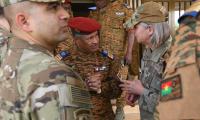Political decentralisation can protect multiparty democracy in Ghana
Ghana’s image as a beacon for democracy in West Africa is fading. The latest election has left the country with a hung parliament and a problematic political culture. Political decentralisation can mitigate the challenges to Ghanaian democracy

Ghana is known as a democratic beacon in West Africa. It is often praised for its peaceful elections, successful changes of government and strong institutions promoting rule of law, peace and order. Political parties are the bedrock of Ghana’s multi-party democracy as the channel for public participation and representation of Ghanaians.
1992-2000: NDC
2001-2008: NPP
2009-2016: NDC
2017 – now: NPP
The political culture of Ghana is however increasingly challenged by monetization and person-driven rather than policy-driven politics. Together with the deadlocked political environment at national level, it all acts as challenges to representation, inclusivity and pluralism.
Ghana has a presidential governance structure with a strong executive power. This leads to a very centralized system, with only minimal room for autonomy and manoeuvring in the municipalities and districts. The president appoints all mayors as well as 30% of District Assembly members. The remaining 70% of assembly members are elected by voters through a “first past the post” electoral system. In local elections, all candidates are independent and cannot run as a candidate for a political party. In reality, most candidates still have close political affiliations, especially to the two dominant parties.
In addition to this, national politics in Ghana remain centralised and elitist in a number of ways:
- Only a small political elite have resources to participate in politics due to the high cost of doing politics.
- Despite being a multi-party system on paper Ghana is de facto a two-party system. Only two parties, the National Patriotic Party (NPP) and the National Democratic Congress (NDC), are represented in Parliament while the numerous minority parties in Ghana struggle to remain relevant.
- The two major parties both have strong centralised structures where local branches are not adequately involved in policy development.
- Political parties only engage citizens during elections and remain dormant between elections.
This is reinforced by the first past the post / winner-takes-it-all electoral system.
The potential of political decentralization
It is possible to mitigate the challenges to Ghanaian democracy. This can be done through political decentralization by allowing political parties to sponsor candidates in local elections and by electing mayors through adult suffrage.
This could promote inclusiveness and reduce the winner-takes all syndrome as all parties, major as well as minor, can win executive power at local level. Party based local elections would also allow for politicians to rise through the ranks of their parties and enter national office already knowledgeable in governance procedures.
The election of mayors would give citizens the opportunity to decide who heads their local government, offer an additional platform for participation in governance and make mayors more accountable and responsive to the needs of citizens. It also prevents situations where defeated parliamentary candidates of the ruling party are rewarded with appointments as mayor.

However, political decentralisation also comes with a pitfall. Allowing political parties to campaign and compete in local elections risks opening the floodgates for national challenges to trickle down. Especially, the unfortunate tendency of monetization of politics could trickle down and negatively impact local development. Importantly, there is also a public concern that the introduction of political parties might lead to more violence as the stakes grow higher.
In the current system, political parties only compete at national level. They have little experience with campaigning at local level. The political parties in Ghana are currently not geared to be effective democratic players at local level. This means that there is a need for building the capacity of big as well as small parties to have campaigns and policies that reflect the local needs.
Recommendations: how to strengthen democracy
- Reform of electoral system: Proportional representation should be introduced at local level to promote representation and curb the winner takes it all syndrome.
- Legal reforms: The Political Parties Act should be reviewed to provide a level playing field and a conducive environment for a multiparty system. There is the need for regulation in order to combat the monetisation of politics and change behaviours by political parties to sanitise the political environment.
- Stronger decentralised governance structure: Political decentralisation needs to go hand in hand with stronger local governance structures.
- Political decentralisation should promote inclusion: particularly women and youth should be adequately represented in decision-making and in political parties.
The role of political parties
Successful local democracy takes strong, inclusive and locally anchored political parties. This means parties should localise politics and tailor policies for local problems; be policy oriented and keep away from personal attacks; strengthen mobilisation and registration of members in online databases; adhere to positive behaviour and attitudes to defuse the public perception of “dirty” political parties; collaborate with civil society organizations to engage communities on the roles and responsibilities of citizens and political parties; and equip party officials to safeguard and contribute to local democracy.
Smaller parties should strategize their efforts by focusing on winning seats in strongholds and using this to showcase what they can do. If minority parties win some districts, this can serve as training grounds and keep them in the political and electoral limelight for future national elections.
Since the reintroduction of democracy in 1992, Ghana has gradually developed into a de facto two-party system, with the National Patriotic Party (NPP) and National Democratic Congress (NDC) dominating the political landscape.
The two big parties
Only NPP and NDC has held power in Ghana’s Fourth Republic. NDC defines itself as a social democratic party, whereas the NPP defines itself as a conservative centre-right party. In reality neither of the parties appear ideology-driven, and there is little difference in actual policy outcomes when it comes to economic or social policy.
Both parties have party structures and branches at national, regional and in all constituencies, electoral areas and polling stations. NDC and NPP both have active women’s wings and youth wings. Despite the existence of such organizational structures, women and youth are underrepresented in decision making and in both parties.
The minority parties
There is no strong third party in Ghana, instead there is vast number of smaller parties. The smaller parties generally have no cohesive ideology in a traditional sense. Generally, these parties have much weaker structures and lack influence on national politics. There are several examples of the two dominant parties adopting policy proposals initiated by smaller parties without giving them credit. Most small parties have a woman wing and a youth wing but of varying strength.

Strengthening Local Multiparty Democracy in Ghana
DIPD and a range of Danish political parties work to strengthen multiparty democracy in Ghana both locally and nationally through the Center for Democratic Development (CDD-Ghana) and the Institute for Democratic Governance (IDEG)




